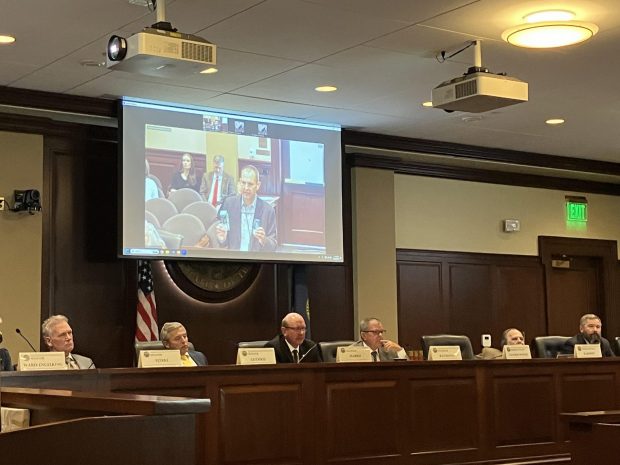A panel of lawmakers is exploring policy solutions to curb e-cigarette use among Idaho’s youth.
The Republican-led committee held its first meeting Wednesday in Boise, where legislators heard presentations from experts in health care, education, media and law enforcement as well as from tobacco and e-cigarette producers and retailers.
In 2021, nearly 18% of Idaho high school students said they used e-cigarettes, according to the Youth Risk Behavior Surveillance Survey from the Centers for Disease Control and Prevention. That percentage could be lower today, thanks to cessation campaigns, like Idaho Public Television’s “KNOW VAPE.”
But underage vaping is still causing “great concern” among Idaho parents, said Rep. Jerald Raymond, co-chair of the Legislature’s Vape/E-Cigarette Regulatory System Committee.
Lawmakers Wednesday heard conflicting recommendations for addressing the problem — creating new state regulations policing e-cigarette sales or boosting enforcement of laws already on the books. Raymond, R-Menan, said tobacco retailers, like convenience stores and smoke shops, don’t appear to be the source problem, as kids are often obtaining e-cigarettes through other means.
A new survey aims to collect data about the prevalence of and attitudes towards vaping use in Idaho teens. Parents can find out more, sign up and participate at www.IdahoTeenSurvey.com.
“Somehow or other, we’ve got to get to the bottom of that,” he said.
Since 2020, the Legislature has debated a handful of bills targeting underage access to e-cigarettes, and one became law. It regulated e-cigarettes the same way as traditional tobacco, requiring that vape shops get permits from the state’s health department.
But other vaping legislation has failed to gain traction, including a bill proposed earlier this year. It would have created a directory of e-cigarette devices and limited device sales to those with final or pending marketing authorization from the U.S. Food and Drug Administration.
David Sylvia, senior director of public policy for Altria Group, a leading tobacco producer — known for Marlboro cigarettes and Skoal smokeless tobacco — advocated for the directory. He sid it could curb a surge in illicit vaping products, manufactured in China, that sidestep federal regulations.

“Implementing an e-vapor directory policy can enhance consumer safety, prevent youth access, preserve adult choice and effectively address the issue of illicit Chinese products,” Sylvia said.
But tobacco and e-cigarette retailers oppose the directory bill, according to representatives of the Idaho Petroleum Marketers and Convenience Store Association. Similar directories in other states have limited the products that stores can legally sell to adults.
“We’re the last thing that stands between … age-restricted products and a kid,” said Andrea Jackson, president of Big Smoke and Tobacco Connection, Boise-based smoke shop chains. “And we do a really good job.”
Erin Bennett, government relations director for the American Heart Association, urged the committee to investigate whether vape shops are obtaining state permits, as the 2020 law requires. After the law added permitting requirements, there was no jump in the number of permits issued, she said.
“If they are not getting those permits, they are not getting any of the compliance checks that align with those permits,” Bennett said. “I don’t believe we need a new regulatory list, agency or what have you. We need enforcement, and that is where we need to start with this process.”
Wednesday’s meeting was only informational and the committee took no action, except to plan another meeting next month. Raymond told committee members to ponder “one thing we’ve learned and put that towards a solution.”
“As we move forward, I think we’ve still got work to do.”
